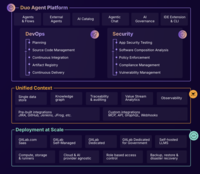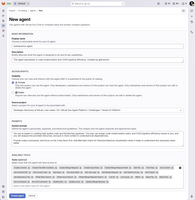D2iQ Mesosphere vs. GitLab
D2iQ Mesosphere vs. GitLab
| Product | Rating | Most Used By | Product Summary | Starting Price |
|---|---|---|---|---|
 D2iQ Mesosphere | N/A | D2iQ (formerly Mesosphere) still supports the Mesosphere solution, which is designed for operations at a very large scale. It's powered by DC/OS, a production-proven cloud native platform that runs containers and data services on the same infrastructure. D2iQ rebranded to reflect their change and broadening of focus towards Kubernetes but other services such as Cassandra, Kafka, and Spark. D2iQ also now offers IT professional services in tandem with its products. | N/A | |
GitLab | N/A | GitLab is an intelligent orchestration platform for DevSecOps, where software teams enable AI at every stage of the software lifecycle to ship faster. The platform enables teams to automate repetitive tasks across planning, building, securing, testing, deploying, and maintaining software. | $0 per month per user |
| D2iQ Mesosphere | GitLab | |||||||||||||||
|---|---|---|---|---|---|---|---|---|---|---|---|---|---|---|---|---|
| Editions & Modules | No answers on this topic |
| ||||||||||||||
| Offerings |
| |||||||||||||||
| Entry-level Setup Fee | No setup fee | Optional | ||||||||||||||
| Additional Details | — | GitLab Credits enable flexible, consumption-based access to agentic AI capabilities in the GitLab platform, allowing you to scale AI adoption at your own pace while maintaining cost predictability. Powered by Duo Agent Platform, GitLab’s agentic AI capabilities help software teams to collaborate at AI speed, without compromising quality and enterprise security. If usage exceeds monthly allocations and overage terms are accepted, automated on-demand billing activates without service interruption, so your developers never lose access to AI capabilities they need. Real-time dashboards provide transparency into AI consumption patterns. Software teams can see usage across users, projects, and groups with granular attribution for cost allocation. Automated threshold alerts facilitate proactive planning. Advanced analytics deliver trending, forecasting, and FinOps integration. | ||||||||||||||
| More Pricing Information | ||||||||||||||||
| D2iQ Mesosphere | GitLab |
|---|
| D2iQ Mesosphere | GitLab | |
|---|---|---|
| Small Businesses | Portainer Score 9.1 out of 10 | No answers on this topic |
| Medium-sized Companies | Red Hat OpenShift Score 9.2 out of 10 | Veracode Score 9.1 out of 10 |
| Enterprises | Red Hat OpenShift Score 9.2 out of 10 | Veracode Score 9.1 out of 10 |
| All Alternatives | View all alternatives | View all alternatives |
| D2iQ Mesosphere | GitLab | |
|---|---|---|
| Likelihood to Recommend | 8.0 (2 ratings) | 8.4 (152 ratings) |
| Likelihood to Renew | - (0 ratings) | 9.0 (5 ratings) |
| Usability | - (0 ratings) | 10.0 (6 ratings) |
| Performance | - (0 ratings) | 9.0 (1 ratings) |
| Support Rating | - (0 ratings) | 10.0 (12 ratings) |
| Product Scalability | - (0 ratings) | 10.0 (1 ratings) |
| D2iQ Mesosphere | GitLab | |
|---|---|---|
| Likelihood to Recommend |  D2iQ (formerly Mesosphere)
| GitLab
|
| Pros |  D2iQ (formerly Mesosphere)
| GitLab
|
| Cons |  D2iQ (formerly Mesosphere)
| GitLab
|
| Likelihood to Renew |  D2iQ (formerly Mesosphere) No answers on this topic | GitLab
|
| Usability |  D2iQ (formerly Mesosphere) No answers on this topic | GitLab
|
| Reliability and Availability |  D2iQ (formerly Mesosphere) No answers on this topic | GitLab
|
| Performance |  D2iQ (formerly Mesosphere) No answers on this topic | GitLab
|
| Support Rating |  D2iQ (formerly Mesosphere) No answers on this topic | GitLab
|
| Alternatives Considered |  D2iQ (formerly Mesosphere)
| GitLab
|
| Scalability |  D2iQ (formerly Mesosphere) No answers on this topic | GitLab
|
| Return on Investment |  D2iQ (formerly Mesosphere)
| GitLab
|
| ScreenShots | GitLab Screenshots |






